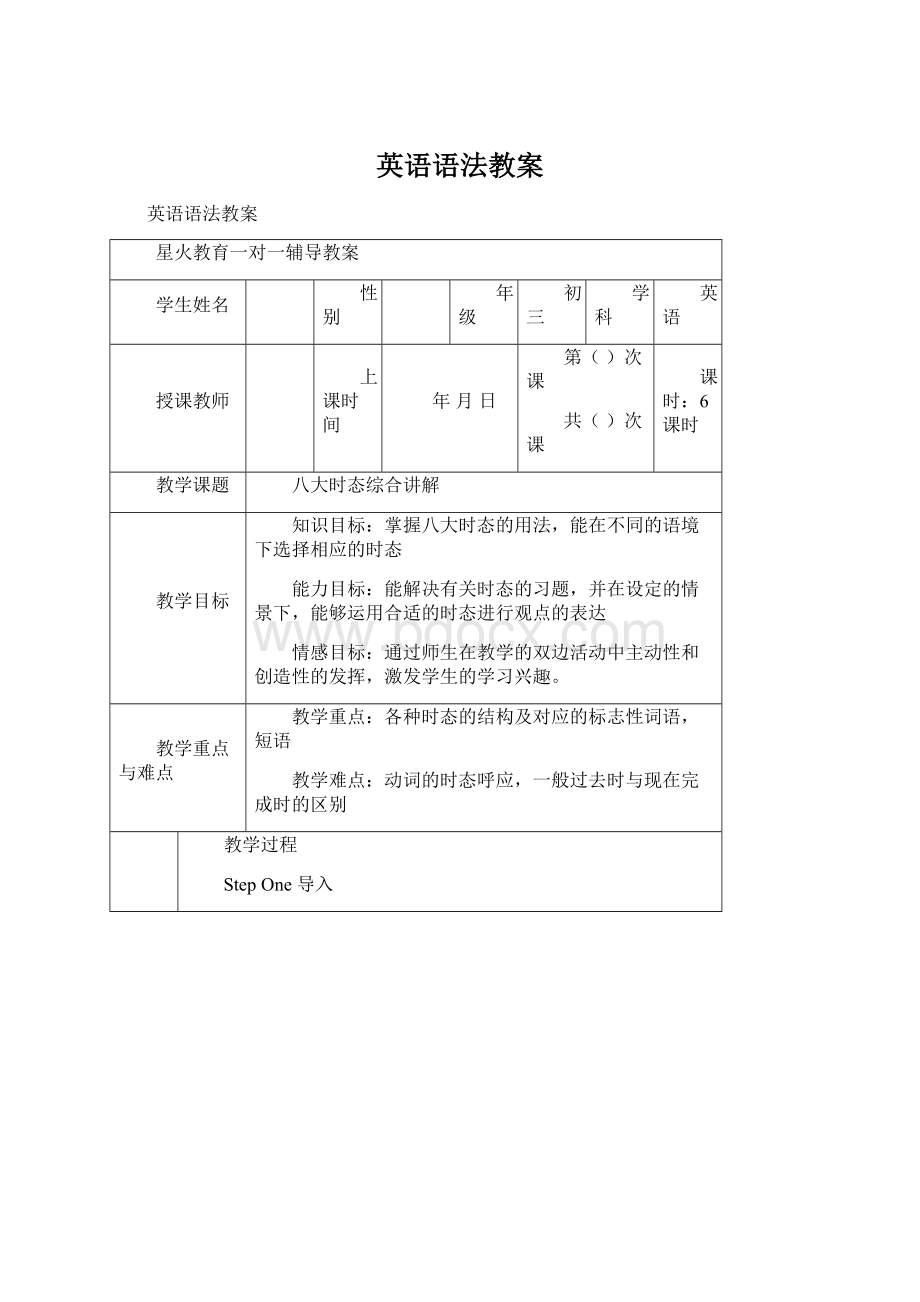英语语法教案Word文件下载.docx
《英语语法教案Word文件下载.docx》由会员分享,可在线阅读,更多相关《英语语法教案Word文件下载.docx(19页珍藏版)》请在冰豆网上搜索。

No,butIhearitisanexcitingmovie.
S4:
……
StepTwo知识讲解与操练
现代英语语法将传统语法所说的“时态(Tense)”分成了两部分:
即“时(Tense)”和“体(Aspect)”。
“时”是指谓语动词发生或存在于不同时间的变化形式,而“体”则指动作进行或过程处于什么状态的变化形式。
动词时态考查的题型多以选择题、完形填空以及书面表达的形式出现,在中考中的比值较重。
英语当中一共有16种时态,中考考纲明确要求考查的是8种,他们分别是
(1)一般现在时
(2)一般过去时(3)一般将来时(4)现在进行时
(5)过去进行时(6)现在完成时(7)过去完成时(8)过去将来时
一般现在时
构成:
a.主语+be的某种形式
b.主语+V原
c.主语(第三人称单数)+Vs/es
当主语是第三人称单数时,谓语动词需加-s或-es:
规则
动词原形
第三人称单数形式
一般在词尾加-s,(清辅音后读∕s∕,在浊辅音后读∕z∕;
在t后读∕ts∕,在d后读∕dz∕。
)
play
leave
swim
plays
leaves
swims
以字母s,x,ch,sh,o结尾的词加-es,读∕iz∕,如果动词原形词尾已有e,则只加-s。
pass
fix
teach
passes
fixes
teaches
以辅音字母加y结尾的词,先变y为i,再加-es,读∕z∕。
study
carry
fly
studies
carries
flies
注意:
动词have的第三人称单数是has.
一般现在时的用法
(1)表示经常的或习惯性的动作,常与表示频度的副词连用。
常用的频度副词有:
sometimes,always、often、usually、seldom、never、everyweek(day,year,month…),onceaweek、onSundays,频度副词在句中通常放在行为动词之前,系动词、助动词之后。
如:
Heoftengoesswimminginsummer.他夏天经常游泳。
Iusuallyleavehomeforschoolat7everymorning.每天早上我七点离开家。
(2)表示现在的状态。
如:
Myfatherisatwork.Heisverybusy.我父亲在工作,他很忙。
Theboyistwelve.这男孩十二岁。
3)表示主语具备的性格、特征和能力等。
Allmyfamilylovefootball.我全家人都喜欢足球。
Mysisterisalwaysreadytohelpothers.我妹妹总是乐于助人。
AnnwritesgoodEnglishbutdoesnotspeakwell.安英语写得不错,讲的可不行。
4)表示客观真理,客观存在,自然现象。
Theearthmovesaroundthesun.地球绕太阳转动。
ShanghailiesintheeastofChina.上海位于中国东部。
5)表示按计划或安排好的,或将要发生的动作,可用一般现在时表将来。
但只限于start,begin,leave,go,come,arrive,return,takeplace等。
Thetrainleavesatsixtomorrowmorning.火车明天上午六点开。
Hecomesbacktonight.他今晚回来。
6)在复合句中,当主句是一般将来时,时间或条件状语从句的谓语动词只能用一般现在时来表示将来要发生的动作。
I'
lltellhimthenewswhenhecomesback.他回来时,我将告诉他这个消息。
Ifyoutakethejob,theywilltalkwithyouingreaterdetails.
如果你接受这份工作,他们将和你谈谈细节。
巩固训练
用括号内动词的适当形式填空。
1.Heoften________(have)dinnerathome.
2.DanielandTommy_______(be)inClassOne.
3.We_______(notwatch)TVonMonday.
4.Nick_______(notgo)tothezooonSunday.
5.______they________(like)theWorldCup?
6.What_______theyoften_______(do)onSaturdays?
7._______yourparents_______(read)newspaperseveryday?
8.Thegirl_______(teach)usEnglishonSundays.
9.SheandI________(take)awalktogethereveryevening.
10.There________(be)somewaterinthebottle.
11.Mike_______(like)cooking.
12.They_______(have)thesamehobby.
13.Myaunt_______(look)afterherbabycarefully.
14.Youalways_______(do)yourhomeworkwell.
15.I_______(be)ill.I’mstayinginbed.
一般过去时
主语+Ved(过去式)
动词过去式的规则变化:
构成规则
动词过去式
一般在动词原形末尾加-ed,(在清辅音后读∕t∕;
在浊辅音和元音后读∕d∕;
在∕t∕,∕d∕后读∕id∕。
look
work
looked
played
worked
结尾是e的动词在末尾加-d
like
live
hope
liked
lived
hoped
末尾只有一个辅音字母的重读闭音节,先双写这个辅音字母,再加-ed
plan
stop
drop
planned
stopped
dropped
结尾是“辅音字母+y”的动词,先变“y”为“i”再加-ed
worry
cry
studied
worried
cried
注:
不规则动词过去式参见不规则动词表。
一般过去时的用法
1)表示过去某个时间所发生的动作或存在的状态。
常和表示过去的时间状语yesterday,lastweek,anhourago,justnow,theotherday,in1982等连用。
在一般过去式中,要表达“过多少时间之后”,一般用after。
几年后。
Wheredidyougojustnow?
刚才你上哪儿去了?
Afterafewyears,shestartedtoplaythepiano.几年后,她开始弹钢琴。
2)表示在过去,经常或反复发生的动作。
常与often,always等表示频度的副词连用。
WhenIwasachild,Ioftenplayedfootballinthestreet.
我是个孩子的时候,常在马路上踢足球。
3)一般过去式也可与today,thisweek,thismonth,thisyear等表现在的时间壮语连用,但这些时间壮语须指过去的时间,决不包含“现在”“此时此刻”的意思。
例如:
Didyouseehimtoday?
今天你看见他了吗?
巩固训练
一、单项选择
1.Myfather___illyesterday.
A.isn'
tB.aren'
tC.wasn'
tD.weren'
t
2.__yourparentsathomelastweek﹖
A.IsB.WasC.AreD.Were
3.Thetwin___inDalianlastyear.They___herenow.
A.are;
wereB.were;
areC.was;
areD.were;
was
4.__yourfatheratworktheday__yesterday(前天)﹖
A.Was;
beforeB.Is;
beforeC.Was;
afterD.Is;
after
5.—WhowasondutylastFriday﹖—____.
A.IamB.IwasC.Yes,IwasD.No,Iwasn'
t
二、请用正确动词形式填空
1.I_________(have)anexcitingpartylastweekend.
2.______she______(practice)herguitaryesterday?
No,she_________.
3.What________Tom________(do)onSaturdayevening?
He________(watch)TVand__________(read)aninterestingbook.
4.Theyall_________(go)tothemountainsyesterdaymorning.
5.She_________(notvisit)herauntlastweekend.
She________(stay)athomeand_________(do)somecleaning.
一般将来时
①主语+will/shall+V原
在口语中,will在名词或代词后常缩为’ll,willnot常简缩为won’t。
在疑问句中,主语为第一人称时(I和we)时,常用助动词shall。
She’llgotoplaybasketball.她要去打篮球。
Shallwegotothezoo?
我们要去动物园吗?
②、begoingto+不定式,表示将来。
表示主语进行某一行动的打算意图。
这种打算常经过预先考虑并含有自己做好某些准备的意思。
即计划,安排要发生的事。
Whatareyougoingtodotomorrow?
明天打算作什么呢?
Theplayisgoingtobeproducednextmonth。
这出戏下月开播。
③、be+toV原形表将来,表示客观安排或受人指示而将要做某事。
WearetodiscussthereportnextSaturday.我们下星期六讨论这份报告。
④、beaboutto+V原形,意为马上、即将要做某事。
不能与tomorrow,nextweek等表示明确将来时的时间状语连用。
HeisabouttoleaveforBeijing.他马上要去北京。
一般将来时的用法
1)、表示将来某个时间要发生的动作或存在的状态,常与tomorrow,nextyear等连用。
llmeetyouattheschoolgatetomorrowmorning.
2)、表示将来经常或反复发生的动作。
I’llcomeandseeyoueverySaturdaynextyear.明年我将每个星期六来看你。
3)、表示说话人对于将来的看法、假设和推测,通常用beafraid,be/feelsure,hope,know,think等后面的从句或与副词perhaps,possibly,maybe等连用。
Ithinkshe’llgobackhomeforsupper.我想她会回家吃饭。
Maybeshe’llgotothegym.也许她会去体育馆。
巩固练习:
单项选择
1.
There__________ameetingtomorrowafternoon.
A.willbegoingto
B.willgoingtobeC.isgoingtobe
D.willgotobe
2.
Charlie________herenextmonth.
A.isn’tworking
B.doesn’tworkingC.isn’tgoingtoworking
D.won’twork
3.
He________verybusythisweek,he________freenextweek.
A.willbe;
is
B.is;
isC.willbe;
willbe
D.is;
willbe
4.
There________adolphinshowinthezootomorrowevening.
A.was
B.isgoingtohaveC.willhave
D.isgoingtobe
5.
–________you________freetomorrow?
–No.I________freethedayaftertomorrow.
A.Are;
goingto;
willB.Are;
goingtobe;
will
C.Are;
D.Are;
6.
Mother________meanicepresentonmynextbirthday.
A.willgiveB.willgiveC.givesD.give
7.
–ShallIbuyacupofteaforyou?
–________.(不,不要。
A.No,youwon’t.
B.No,youaren’t.C.No,pleasedon’t.
D.No,please.
8.
–Whereisthemorningpaper?
–I________ifforyouatonce.
A.get
B.amgettingC.toget
D.willget
9.
________aconcertnextSaturday?
A.Therewillbe
B.WilltherebeC.Therecanbe
D.Thereare
10.Iftheycome,we________ameeting.
A.have
B.willhaveC.had
D.wouldhave
过去将来时
过去将来时由助动词should或would加动词原形构成。
过去将来时的用法
a.用于从过去某一时间来看将要发生的事情。
常用在宾语从句中表示从句的动作发生在主句动作之后。
Theysaidtheywouldgotovisitthesecondfactory.他们说他们将要去参观第二个工厂。
TheteachertoldusthattherewouldbeaconcertthenextTuesday.
老师告诉我们下周二将要有场音乐会。
b.过去将来时也可由“was/weregoingto+动词原形”来表示。
Shesaidshewasgoingtoseeheruncle.她说她要去看望她的叔叔。
“would+动词原形”有时并不表示过去将来时,而表示一种客气的请求。
Wouldyoupleaseopenthewindow?
1.---Theplaneisleavingrightnow,butJimhasn'
tarrivedyet.
---Well,hesaidhe_____hereontime.
AcameBwouldcomeCcanbeDwillbe
2.She_____thatshe_____herbesttohelpthemthenextterm.
A.says…willdoB.said…willdoC.said…woulddoD.says…woulddo
3.Jack_____thatthey_____surprisedtoseeitthisFriday.
A.know…wouldbeB.knows…willbeC.knew…wouldbeD.knew…willbe
4.She____illsoshe____abletogoskatingthenextday.
A.is…won'
tbeB.is…wouldn'
tbeC.was…won'
tbeD.was…wouldn'
tbe
5.He_____thethieftothepolicewhenhe_____themanagain.
A.wouldtake…wouldmeetB.wouldtake…met
C.willtake…willmeetD.willtake…meet
6.LiMingsaidhe___happyifBrian____toChinanextmonth.
Awas;
come
Bwas;
wouldcomeCwouldbe;
came
Dwillbe;
come
现在进行时
am/is/are+动词的现在分词
动词V-ing的构成形式
原形
-ing形式
一般在动词原形末尾加-ing
listen
spend
stay
listening
spending
staying
以不发音字母e结尾的动词,先去掉e,再加-ing
have
prepare
close
having
preparing
closing
以重读闭音节结尾的动词,如果末尾只有一个辅音字母,应先双写这个辅音字母,再加-ing
sit
begin
run
put
sitting
beginning
running
putting
以ie为重读音节结尾的动词,先去掉e,把i改为y,再加-ing
lie
die
lying
dying
以er结尾的动词,如是重读音节结尾,先双写r,再加-ing;
如不是重读音节结尾,就直接加-ing
prefer
water
preferring
watering
现在进行时的用法:
1)、表示现在(指说话人说话时)正在发生或进行的动作。
常与now,rightnow,atthismoment等时间状语连用。
Wearewaitingforyounow.我们正在等你。
2)表示现阶段(说话前后一段时间内),一直在进行的活动。
说话时动作未必正在进行。
Mr.Greeniswritinganothernovel. 他在写另一部小说。
(说话时并未在写,只处于写作的状态。
Heisthinkingaboutthisproblem.这些天来他一直在考虑这个问题。
3)表示反复发生的动作或持续存在的状态,常与always,constantly,forever等词连用,往往带有说话人的主观色彩。
Youarealwayschangingyourmind.你老是改变主意。
4)表示渐变,这样的动词有:
get,grow,become,turn,run,go,begin等。
Theleavesareturningred.叶子在变红。
It'
sgettingwarmerandwarmer.天越来越热了。
5)表示按计划或安排要发生的动作。
表移动的终止性动词(come,go,arrive,leave,start,begin,return等)用于现在进行时,表示即将要发生动作。
mleavingtomorrow.明天我要走了。
Thetrainisarrivingsoon.火车要到了。
1.”Whatishedoing?
”“He___________music.”
A.listeningB.islisteningC.listenstoD.islisteningto
2.Listen!
She_____songsinEnglish.
A.singsB.singC.issingingD.issing
3..What______you______at?
A.are;
seeingB.are;
watchingC.are;
listeningD.are;